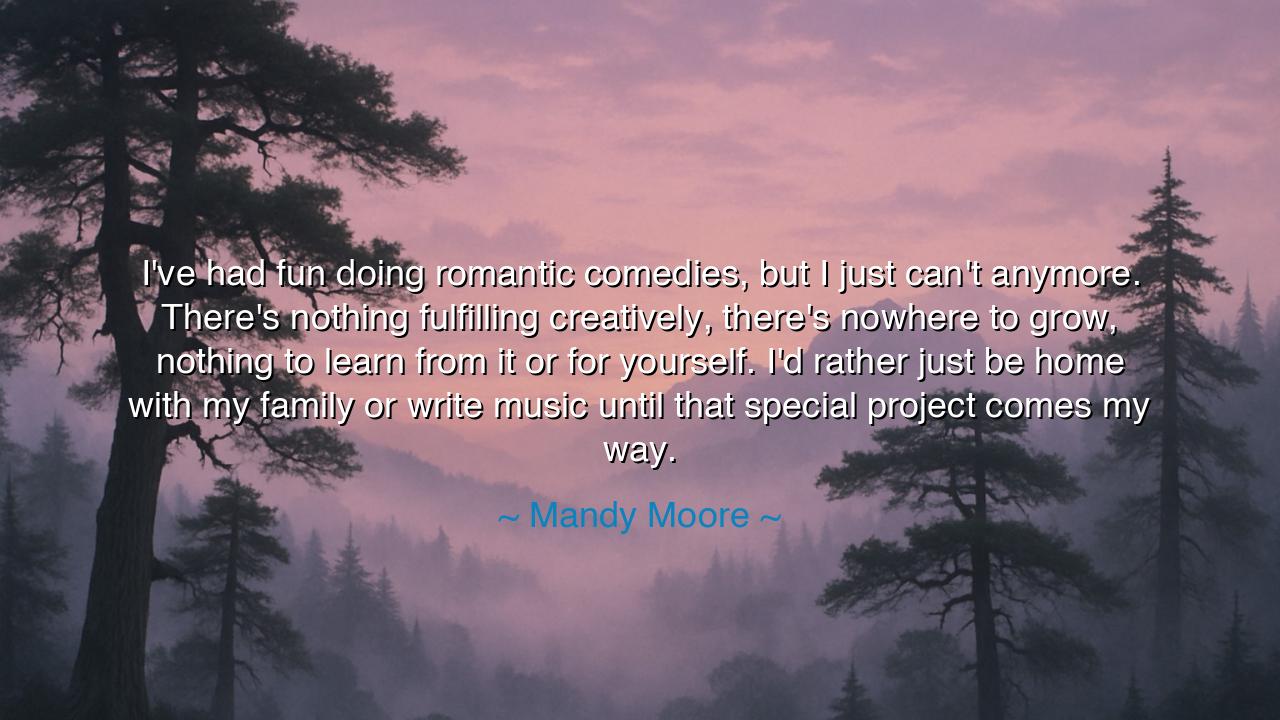
I've had fun doing romantic comedies, but I just can't anymore.
I've had fun doing romantic comedies, but I just can't anymore. There's nothing fulfilling creatively, there's nowhere to grow, nothing to learn from it or for yourself. I'd rather just be home with my family or write music until that special project comes my way.






"I've had fun doing romantic comedies, but I just can't anymore. There's nothing fulfilling creatively, there's nowhere to grow, nothing to learn from it or for yourself. I'd rather just be home with my family or write music until that special project comes my way." These words from Mandy Moore reflect a profound and relatable truth about the pursuit of personal growth and artistic fulfillment. Moore’s admission highlights the importance of evolution in one’s creative journey, as she moves beyond the surface-level entertainment of romantic comedies to seek deeper, more meaningful projects. It is a recognition that true creativity comes from engagement with work that challenges and inspires the soul, rather than simply providing temporary satisfaction or comfort.
In the ancient world, growth—whether intellectual, emotional, or creative—was viewed as essential to fulfilling one’s potential. Take, for instance, the great Greek philosopher Socrates, who famously declared, "The unexamined life is not worth living." This statement reflects his deep belief that self-reflection, learning, and growth were the core of true fulfillment. Socrates spent his life questioning the status quo, engaging in dialogues that challenged conventional wisdom and sought to uncover deeper truths about the human condition. Mandy Moore’s realization mirrors this ancient wisdom: without growth and creative challenge, there is little value in continuing on a path that feels stagnant or unrewarding.
Similarly, the Romans had a concept of personal duty and growth that extended beyond superficial pleasure. In his letters, Seneca, the Stoic philosopher, emphasized the importance of pursuing a life of purpose over indulgence. He warned against seeking comfort at the cost of spiritual development, urging individuals to look inward for fulfillment. For Seneca, as for Moore, creative work—whether in writing, art, or philosophy—should be a means of self-expression and growth, not just a vehicle for momentary enjoyment. The sense of duty to one’s own development was more important than following a path simply because it was easy or lucrative.
Mandy Moore’s decision to step away from the formulaic nature of romantic comedies reflects the timeless struggle between art and commerce. The ancient Greeks also wrestled with this balance in the realm of theater. In Aristotle's Poetics, he discusses the role of tragedy in the theater, asserting that the purpose of art is not mere entertainment but to elicit catharsis—a purging of emotions that leads to growth and understanding. For Moore, the joy she once found in the predictability of romantic comedies gave way to a desire for more meaningful, transformative work—work that might allow her to evolve as an artist, just as Aristotle believed that art should not only entertain but illuminate.
In the modern age, the Hollywood system often locks actors into certain roles based on their success in specific genres. Moore’s words acknowledge the limits of such formulas, where a career may become increasingly narrow without the possibility of personal development. Take the example of Orson Welles, a director and actor who was famous for his role in Citizen Kane, a film that is now regarded as one of the greatest achievements in cinema. Welles struggled against being pigeonholed into roles that did not allow him to fully express himself as an artist. Much like Moore, he yearned for work that would challenge him and allow him to grow, both as an actor and a director. Welles sought not just fame, but the opportunity to create something of lasting value.
The lesson in Moore’s reflection is clear: creative fulfillment does not come from following the crowd or remaining in a comfortable space. Just as Socrates urged for a life of constant growth, and Welles fought against being reduced to mere entertainment, we too must strive for authenticity and challenge in our pursuits. True creativity arises when we are willing to step beyond the familiar and explore uncharted territory—whether that means changing career paths, pursuing new forms of expression, or simply taking the time to reflect on our work and grow from it.
In our own lives, we must have the courage to walk away from what no longer serves us, just as Mandy Moore did with her earlier roles. Let us embrace challenges, knowing that growth—whether personal, professional, or artistic—requires time, dedication, and sometimes the willingness to leave behind what is comfortable for something more meaningful. Whether in our careers, relationships, or personal development, we must continually seek out experiences that push us forward, that expand our horizons, and that nurture our deepest selves. Only in this way can we, like Moore, find the fulfillment that comes from doing work that is not only successful but also authentic and transformative.






AAdministratorAdministrator
Welcome, honored guests. Please leave a comment, we will respond soon